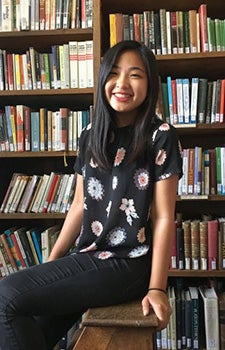
Driven to help immigrants graduate finds her path at USC
Tingyee Chang arrived as a freshman at USC with a mission: She wanted to help immigrants. Maybe she’d become an immigration attorney, she recalls thinking.
Four years later, preparing to graduate as a Discovery, Global and Renaissance Scholar, that same focus on immigrants still drives her. But her career dreams have shifted dramatically.
She came seeking meaning and purpose, she said, “and USC gave me an opportunity to explore.”
Career inspiration from USC experiences
Chang’s parents moved from Taiwan to the United States for graduate school before settling in Sunnyvale, California. She grew up surrounded by a mix of cultures.
“I see myself in everybody who shares that background, whether they are immigrants themselves or their parents came here,” said Chang, a recipient of USC’s Trustee Scholarship. “These are my people.”
In college, she volunteered at legal aid clinics, helping immigrants fill out legal paperwork to become naturalized citizens. One summer, she assisted “Dreamers,” young migrants brought here as children and now searching for a way to stay in the country legally.
But she began to question whether she could have a broad impact on immigration issues through law. She had serious doubts about her direction by the end of her sophomore year.
Around that time, Chang took a class in the interdisciplinary Thematic Option honors program offered through USC Dornsife College of Letters, Arts and Sciences. Taught by Paul Lerner, professor of history at USC Dornsife, the course explored the evolution of perceptions about mental illness since the Victorian era. It sparkedher enthusiasm for mental health.

Tingyee Chang at King’s College Library at the University of Cambridge. (Photo: Courtesy of Tingyee Chang.)
“It changed my life at just the right time,” she said. “It was the coolest class I’ve ever taken.”
Then she went to a study abroad program at the University of Cambridge. As part of her studies, she dove deep into research to write an essay on the history of attention-deficit/hyperactivity disorder and treatment.
She started looking for ways to tie her passion for helping immigrants with her newfound interest in mental well-being. At the same time, the demands of college life caught up with her. She felt burned out.
“I was really tired and kind of sad all the time, and I ended up going to therapy,” she said.
A deeper interest in mental health
Therapy helped Chang recover. It also spurred her toward studies in mental health.
“In that moment, I saw myself in the research I had been doing,” she said. “This is important stuff, and it’s important for me to do this kind of stuff. I started to see myself as someone who could contribute meaningfully.”
She returned to USC as a junior with renewed energy and clarity. She declared a double major in neuroscience at USC Dornsife and public policy at USC Price School of Public Policy. She held a workshop with fellow student Natasha Arief about mental health in the Asian Pacific American community, discussing how to address stigma and poor access to treatment. And she plunged into the rigorous, detail-oriented research she had relished at Cambridge.
Working alongside Stanley Huey, associate professor of psychology and American studies and ethnicity at USC Dornsife, Chang launched a wide-ranging study into treatments for mental health issues like PTSD and intrusive memories among refugees.
Seven months into the project, Chang presented her preliminary findings at the recent USC Undergraduate Symposium for Scholarly and Creative Work. Huey said he is impressed by Chang’s determination to acquire the technical knowledge needed to pursue her project.
“You don’t have to push her,” Huey said. “You just provide a little guidance, and she runs with it.”
Chang hopes to complete her research by summer and submit the paper for publication. “This has been one of the most rewarding experiences I’ve had at USC,” she said.